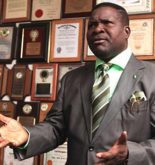By: Ifeatu Agbu
The Corporate Head Office of the Nigeria Liquefied Natural Gas Limited, NLNG, came alive on Tuesday, October 10, 2023, as it hosted the Management team from the Niger Delta Development Commission, NDDC, that came for a unique engagement.
It was an auspicious occasion for the consummation of a new mutually beneficial relationship between the two organisations involved in the development of the Niger Delta region.
In a remarkable turn of events, the NDDC and NLNG, which a few years ago were in dispute over statutory financial contributions, signed a Memorandum of Understanding (MoU) to leverage shared aspirations and collaborate on diverse fronts in the delivery of sustainable development projects in Nigeria’s oil-rich region.
The deal was sealed by the Managing Director and Chief Executive Officer of NLNG, Dr Philip Mshelbila, and NDDC’s Managing Director, Dr Samuel Ogbuku, who signed for their organisations.
Interestingly, the two organisations agreed to collaborate and partner to empower communities in the region, promote local content and capacity development, and work with stakeholders along the value chain to deliver sustainable development projects effectively.
What makes the partnership unique is that between 2016 and 2017, the two organisations were before the National Assembly to defend their positions on the provisions of the NDDC establishment Act, specifically section 14 (2)(b), which stipulates “that three per cent of the total annual budget of any oil producing company operating onshore and offshore in the Niger Delta area, including gas processing companies like NLNG, shall pay the said percentage into the funds of the Niger Delta Development Commission.”
The NDDC had complained to the National Assembly that the NLNG Limited was not contributing to the Commission’s fund as required by the NDDC Act, 2000. In response to the complaint, the NLNG argued that the Nigeria LNG (Fiscal incentives, Guarantees and Assurances) Act exempted it from such contributions or payments.
The NLNG anchored its position on a Supreme Court judgment which described NLNG as a gas processing company, stating that there is a Gas Act that came before that of NDDC Act. They argued that the NDDC Act did not repeal the Gas Act, claiming that the Gas Act gave them tax holiday.
However, on May 9, 2017, the House of Representatives passed a bill which requires the payment of three per cent of annual budget of the NLNG Limited, into the coffers of the NDDC. The amendment bill, adjusted the Nigeria LNG (Fiscal Incentives, Guarantees and Assurances) Act and the Senate subsequently passed the same bill.
During the debate that led to the amendment of the NLNG Act of 2004, it was argued that with the untold environmental and health havoc wreaked on the people of the Niger Delta for decades, the only way to solve the problem was to bring relevant amendments to the Act.
As the debate raged on, Niger Delta stakeholders maintained that the region had suffered for too long and it was imperative that development agencies, such as the oil companies, the federal, state, local governments, the Ministry of Niger Delta Development and the NDDC, must collaborate at different levels to drive a regional development master plan.
It is worthy to note that the NDDC had always joined forces with key stakeholders in confronting the enormous challenges of making a difference in the lives of the people in the remote communities of the Niger Delta region. One of such collaborations is in the construction of the 29-kilometre Ogbia-Nembe road, which it undertook in partnership with the Shell Petroleum Development Company, SPDC.
The multi-billion-naira project illustrates the kind of challenges confronting the Niger Delta. It cuts through the swamps with ten bridges and 99 culverts. The terrain is such that four metres of clay soil had to be dug out and then sand-filled to provide a base for the road. It shouldn’t surprise anyone, therefore, to learn that constructing a road in this tough environment costs twice or thrice what is required in other parts of the country.
This is just one of the many mega projects being executed by the interventionist agency with the limited funds at its disposal. Without doubt, the NDDC needs to be adequately funded to enable it confront the challenges of developing the region that gives Nigeria its oil wealth.
The NDDC Act states clearly how the commission shall be funded. Section 14[2] provides that “there shall be paid and credited to the fund established pursuant to subsection [1] of this section; [a] from the Federal Government the equivalent of 15 per cent of the total monthly allocation due to the member states of the commission from the federation account, this being the contribution of the Federal Government to the commission; [b] three per cent of the total annual budget of any oil-producing company operating onshore and offshore in the Niger Delta area, including gas processing companies; [c] 50 per cent of monies due to member states of the commission from the ecological fund…” and other sources such as grants and loans.
The provisions of the law encouraged the legislators to delve into the matter between the NDDC and the NLNG. After investigations by the relevant committees of both the Senate and the House of Representatives, the tussle over who pays what was resolve in favour of the NDDC.
Thus, the impasse over the non-payment by gas processing companies to the NDDC fund was put to rest with the amendment of the relevant laws.
Those amendments of 2017 have today opened new vistas for the NDDC and the NLNG and an elated NDDC Managing Director, Dr Ogbuku, stated that the pact demonstrated unity towards sustainable development and progress in Nigeria.
The NDDC boss noted that the MoU heralded a new era of collaboration for the betterment of the Niger Delta region and the nation.
He stated: “While the NDDC and NLNG each have unique missions, their common goals emphasise sustainable development, socio-economic empowerment, local content promotion, capacity building, and stakeholder collaboration. This alliance represents a pivotal moment in Nigeria’s journey towards progress and prosperity.
“It is a testament to the power of unified action in addressing the complex challenges faced by the Niger Delta region and the nation. The NDDC and NLNG are poised to create a more prosperous, inclusive, and sustainable future for Nigeria and its people.
“NLNG is recognised as a significant player in the global LNG industry, committed to conducting its operations with environmental responsibility and contributing to monetising Nigeria’s invaluable natural resources. Similarly, the NDDC is committed to promoting sustainable development within the Niger Delta, focusing on the delicate balance between economic growth, environmental stewardship, and the well-being of local communities,” he stated.
According to Ogbuku, the NDDC is dedicated to uplifting the Niger Delta region through targeted initiatives to enhance livelihoods, education, healthcare, and socio-economic conditions.
He said the organisation strongly emphasises empowering local communities through skills training, support for small and medium-sized enterprises, promoting self-sufficiency and building solid relationships with state governments, local communities, non-governmental organisations, and private enterprises to design and implement practical development projects within the Niger Delta region.
He stated that the partnership with NLNG underscores a shared commitment to inclusive governance and comprehensive development.
For the NLNG Chief Executive Officer, Dr Mshelbila, the partnership with NDDC would set a precedent for how such collaborations can drive positive change in the Niger Delta region. He said NLNG’s goal was to replicate the success of its projects and initiatives across the Niger Delta, working closely with NDDC to maximise the impact of collective efforts.
He stated: “Today, we are proud to formalise our partnership with NDDC, an organisation empowered to deliver development projects in this vital region of our nation. At Nigeria LNG, our journey has always been guided by a commitment to seek strategic partners in sustainable development. This commitment is deeply rooted in our core values and principles, and it drives us to continuously explore innovative avenues to make a meaningful impact on the lives of those we serve. Our partnership with NDDC is evidence of this commitment.
“We believe that the highest standards of project execution and accountability are essential to achieving our sustainable development outcomes. We intend to share knowledge and build capacity with NDDC to make these outcomes feasible,” Dr. Mshelbila added.
The MoU seeks to promote harmonious relationships between the two organisations as an enabler for achieving a common goal of facilitating the sustainable and continuous development of the Niger Delta region through investment in development projects that will maintain peace and security in the region.
The agreement is also expected to provide a framework for partnership between the organisations to maximise the impact of NLNG’s contributions to NDDC through effective delivery of development projects in the Niger Delta in an objective, judicious, transparent, sustainable, auditable manner and with due regards to accountability and global best practice.




